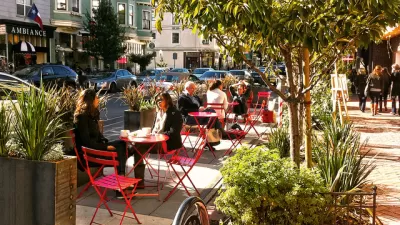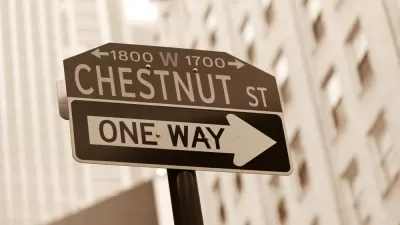A new study from Drexel University's Lindy Institute for Urban Innovation surveys the obstacles and challenges making it more difficult to build car-free public spaces, like plazas and parklets, in Philadelphia.

"Plazas and parklets — parking spaces repurposed for other uses — remain a relative rarity in Philadelphia, and a new study has determined that a lack of staff, funding and leadership, and a convoluted bureaucracy contribute to keeping neighborhoods from embracing these improvements," according to an article by Jason Laughlin.
Despite the wide variety of options available for transforming public space currently devoted to automobile travel or storage, barriers to entry remain at almost every step of the process in Philadelphia, according to a new report by researchers from Drexel University, with help from officials at the city.
According to Laughlin, "the study found people consistently didn’t have enough information about how to apply to build a parklet or plaza, lacked money to invest in one, and were confused by the city’s processes. A flow chart of the city’s application to create a parklet or plaza showed an eight-step odyssey through city agencies and public approvals that offered no clear sense of cost or specifics about what was needed for a site to gain approval. Reviewing an application could take days or a year, depending on how busy the relevant agencies are."
The article includes more on the benefits of parklets and plazas, and local examples of processes that have achieved completion in Philadelphia despite the myriad challenges that stood in the way.
FULL STORY: When it comes to adapting street space for pedestrians, Philly needs a better road map

Planetizen Federal Action Tracker
A weekly monitor of how Trump’s orders and actions are impacting planners and planning in America.

Maui's Vacation Rental Debate Turns Ugly
Verbal attacks, misinformation campaigns and fistfights plague a high-stakes debate to convert thousands of vacation rentals into long-term housing.

San Francisco Suspends Traffic Calming Amidst Record Deaths
Citing “a challenging fiscal landscape,” the city will cease the program on the heels of 42 traffic deaths, including 24 pedestrians.

Amtrak Rolls Out New Orleans to Alabama “Mardi Gras” Train
The new service will operate morning and evening departures between Mobile and New Orleans.

The Subversive Car-Free Guide to Trump's Great American Road Trip
Car-free ways to access Chicagoland’s best tourist attractions.

San Antonio and Austin are Fusing Into one Massive Megaregion
The region spanning the two central Texas cities is growing fast, posing challenges for local infrastructure and water supplies.
Urban Design for Planners 1: Software Tools
This six-course series explores essential urban design concepts using open source software and equips planners with the tools they need to participate fully in the urban design process.
Planning for Universal Design
Learn the tools for implementing Universal Design in planning regulations.
Heyer Gruel & Associates PA
JM Goldson LLC
Custer County Colorado
City of Camden Redevelopment Agency
City of Astoria
Transportation Research & Education Center (TREC) at Portland State University
Jefferson Parish Government
Camden Redevelopment Agency
City of Claremont





























